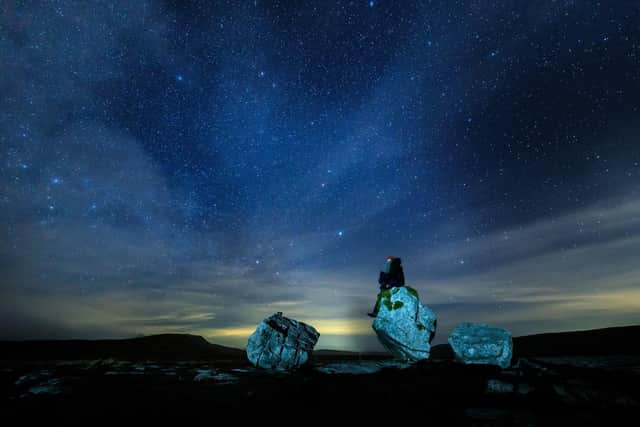Yorkshire Dark Skies Reserves: Battle to prevent light pollution intensifies
The Yorkshire Dales and North York Moors National Parks have become increasingly popular in recent years as locations for astronomy, and they were both officially designated as Dark Skies Reserves a year ago this month.However, officers at both National Parks have stressed that work is being stepped up to ensure that light pollution is minimised and the dark skies are protected.
Audits are being undertaken on buildings in the National Parks to assess their lighting, while monitoring equipment is being installed to ensure that the dark skies are not being impacted.
Advertisement
Hide AdAdvertisement
Hide AdThe dark skies officer at the North York Moors National Park Authority, Mike Hawtin, said: “Many people may have thought that the hard work stopped once we achieved the dark skies designation.


“However, that is far from the case, and the designation has taken things to another level - it shows that we are serious about protecting our dark skies.
“At a time when we’re often paralysed into inactivity by the seemingly unfathomable solutions to climate change and environmental harm, light pollution is one of the easiest forms of pollution to solve, with immediate and visible benefits.”
Throughout the past 12 months, work in the Dales and Moors has involved liaising with businesses and home-owners to minimise the impact of lighting on their premises on the night skies.
Advertisement
Hide AdAdvertisement
Hide AdOne of the most famous locations for star-gazers in the Yorkshire Dales is at the Ribblehead Viaduct, and talks are under way with the nearby Station Inn to reduce the impact of its lighting.
In the North York Moors, work is continuing with landowners such as the Ministry of Defence, which oversees RAF Fylingdales, Forestry England, the National Trust and the North
Yorkshire Moors Railway to improve lighting on their land and properties.
A total of 21 businesses in the Yorkshire Dales have secured the dark skies-friendly status, with a similar number of enterprises in the Moors also being given the accolade for their work to ensure they have environmentally-friendly lighting.
Advertisement
Hide AdAdvertisement
Hide AdThe Star Hub at Sutton Bank National Park Centre was officially opened in September, and the wooden-clad hub provides a prime spot for studying the spectacular night skies.
It is also aimed at providing a focal point for visitors during the day to find out more about the environment of the North York Moors.
Plans are being drawn up to install a six-strong network of permanent dark sky meters across the North York Moors to supplement the work of teams of volunteers who are monitoring the night skies above the National Parks.
A special fireball camera is also being planned for Sutton Bank to monitor the skies and record meteorites and shooting stars.
Advertisement
Hide AdAdvertisement
Hide AdThe dark skies designation has also captured the public’s imagination, according to Kathryn Beardmore, the director of park services at the Yorkshire Dales National Park Authority.
She highlighted an example of seven parish councils in the Dales which have come forward to volunteer to turn their street lights off between 11pm and 5am.
Mrs Beardmore said: “It has been wonderful to see how the dark skies designation has captured people’s attention, and it has proved invaluable for us to be able to promote the area.”
An annual Dark Skies Festival, which was established in 2016, will once again be staged in February, bringing in thousands of visitors to both the Dales and the Moors at a time when the annual tourism cycle is at its quietest.
Advertisement
Hide AdAdvertisement
Hide AdA study released last year revealed that dark skies tourism in Northumberland, which received its own designation in 2013, is worth as much as £25m each year.
The announcement in December last year that both National Parks had been designated as Dark Skis Reserves was the culmination of five years of work.
The International Dark-Sky Association granted Reserve status to both areas, which combined cover more than 1,350 square miles of northern England.
It was by far the biggest such announcement in the UK and represented one of the largest areas in Europe to be simultaneously designated.
Advertisement
Hide AdAdvertisement
Hide AdIt means both the Yorkshire Dales and the North York Moors have joined an exclusive club around the globe.
Other sites that have protected status include the Grand Canyon and Death Valley National Parks in the United States of America, Mont-Mégantic National Park in Canada and NamibRand Nature Reserve in Namibia.
The importance of preserving the night skies and minimising light pollution has been highlighted in Westminster.
The All-Party Parliamentary Group for Dark Skies published a report in December last year, and called on the Government to set up a statutory Commission for Dark Skies and designate a new Minister for the Dark Sky.
